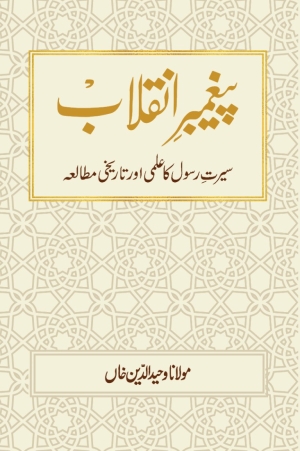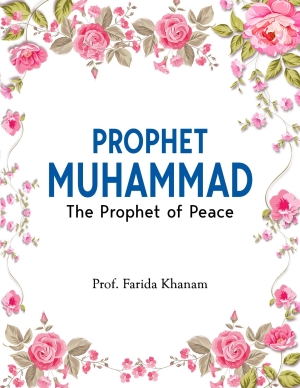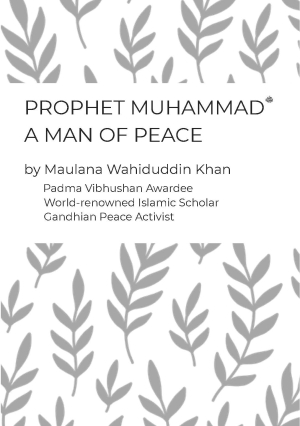In an American publication entitled ‘The Hundred,’ the author Dr Michael Hart, places Prophet Muhammad in the number one position of the most successful people in history, writing: “He was the only man in history, who was supremely successful on both the religious and secular levels.” (Dr Michael Hart, The Hundred, New York, 1978) Maulana Wahiduddin Khan explains that the secret of this outstanding success achieved by the Prophet of Islam was, in one word: peace. The Quran states, “Reconciliation is the best.” (4:128) In controversial matters, a peaceful course of action is far more effective than having recourse to violence. The Prophet of Islam was the greatest pacifist in history. He exploited peace as an unconquerable force.
A study of the life of the Prophet of Islam tells us that the Prophet discovered peace both as a complete ideology and as a methodology, which was the most effective strategy in all matters. The mission of the Prophet of Islam was utterly peaceful, that of spiritual purification of individuals. The Quran calls it the purification of the soul (2:129), developing a positive personality. Such a mind re-engineering can only be achieved through counselling and persuasion and awakening man’s ability to think. The means of achieving it is not a political revolution but rather an intellectual revolution. It can only take place in an atmosphere of peace. Prophet Muhammad was a Prophet of Peace to the fullest extent. All the teachings of Islam are entirely based directly or indirectly on the concept of peace.
Featured Articles
Featured Videos
FAQs
In the religion brought by Prophet Muhammad, peace was the rule and war was the rare exception, a measure to be resorted to as an unavoidable option in the case of armed aggression by an attacker. Prophet Muhammad demonstrated his profound wisdom in his method of negotiating the Hudaybiyyah peace treaty. By unilaterally accepting the conditions of his opponents, he concluded a historic ten-year no-war pact, without apparently receiving justice or his rights. By means of this peace treaty, the Prophet and his Companions were able to consolidate themselves so thoroughly that they had no need to wage war to attain justice.
The truth is that the above-mentioned principle of the Prophet is not only a religious principle: it is also a law of nature. And it is a fact that in this world only those people achieve success who follow the law of nature, while those who deviate from it are doomed to failure.
A tradition narrated by Ayesha, the Prophet’s wife, provides a guiding principle. She said: ‘Whenever the Prophet had to choose between two courses, he would always opt for the easier one’ (Sahih, Al-Bukhari, Hadith No. 1492). This means that whenever the Prophet had two options before him in any matter, he would always abandon the harder option in favour of the easier one.
This tradition (sunnah) of the Prophet Muhammad is relevant not only to everyday affairs but also to such serious matters as, by their very nature, entail more difficult options.
The truth is that in life we have to face the problem of choosing between two courses: between the confrontational and the non-confrontational, between the peaceful and the violent. The study of the Prophet’s life tells us that the Prophet, in all matters, abandoned the violent or confrontational course in favour of the peaceful or non-confrontational course. The whole life of the Prophet provides a successful, practical example of this principle.
Prophet Muhammad was indeed a Prophet of Peace. He gave an ideology of peace to the world based on the creation plan of God, and a methodology to establish peace based on the Hudaybiyyah model of peace. The exemplary life the Prophet lived serves as an unfailing guide to right thinking and right living. Through his example, man can understand how to live in accordance with the creation plan of God. This is the greatest boon of the Prophet to the modern man. His teachings give man the opportunity to live his life in a far better way, and on a far higher plane.
Source: The Prophet of Peace
Many historians have acknowledged that the Prophet of Islam achieved extraordinary success in his life. For instance, Michael Hart states in his book, The 100, that Prophet Muhammad was supremely successful on both the religious and the secular levels, and places him right at the top of his list of the one hundred most illustrious names in the entire range of human history. (Michael H. Hart. The 100: 1978) But this author does not tell us how the Prophet of Islam managed to achieve this extraordinary success. The secret lay in his being perhaps the first person in history who adopted the principle of ‘peace for the sake of peace’.
Prophet Muhammad went out of his way to follow this policy of peace throughout his life, contrary to the misconception that a significant part of his life was spent waging wars. The Prophet also made the important point that peace in itself does not necessarily lead us to our goals. It rather opens the door to opportunities, by availing of which we can achieve our desired goals. The Prophet of Islam was the Prophet of Peace, in the full sense of the expression. All his teachings, directly or indirectly, are based on peace.
Source: The Prophet of Peace
The study of the Prophet's life shows that he never initiated a military move himself. When his opponents wanted to embroil him in war, he would on all occasions resort to some strategy of avoidance to avert war. He fought only when there was no other way left to him. According to the sunnah of the Prophet, there is no aggressive or offensive war in Islam. Islam allows only a defensive war and that, too, only when there is no other option.
The few ‘battles’ that took place throughout his life were purely defensive in nature. These were of such short duration that they could more appropriately be called skirmishes. The Second World War lasted six years, whereas the total duration of the Prophet’s ‘battles’ was less than six days.
Prophet never waged war against the injustices done to him and his Companions. What he did, first of all, was to establish peace through unilateral adjustment. He later availed of the opportunities this offered to achieve his desired goals. It was this wise principle which the Prophet honoured throughout his entire life.
Political power was not the goal of the Prophet of Islam. The actual goal of his prophetic mission was to help people to lead their lives in accordance with the straight path laid down by God so that they might have an eternal share in God's mercy.
When this objective of the Prophet of Islam’s mission is borne in mind, it becomes abundantly clear that the Prophet of Islam was indeed the Prophet of Peace.
Source: The Prophet of Peace










